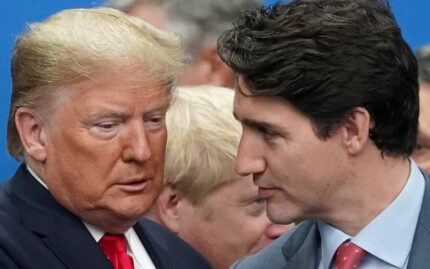The recent meeting between former President Donald Trump and Canadian Prime Minister Justin Trudeau at Mar-a-Lago has sparked significant diplomatic dialogue. Held in Trump’s Florida estate, the encounter marked a critical moment in US-Canada relations, with both leaders emphasizing the “productive” nature of their discussions. Trudeau, who traveled to West Palm Beach, engaged in what he described as an “excellent conversation” with the potential future president.
The meeting came at a crucial time, particularly in light of Trump’s previous threats to impose a 25% tariff on Canadian goods. Despite potential tensions, both leaders appeared committed to finding constructive solutions to shared challenges, signaling a potential collaborative approach to complex bilateral issues.
Trade Relations Dominate Discussions between Trump and Trudeau meeting
The meeting comes against the backdrop of Trump’s recent announcement of a proposed 25% tariff on Canadian goods, a move that has sparked widespread concern in Canada. Trudeau, seeking to avert the economic fallout of such a tariff, emphasized the importance of trade ties between the two nations.
Both leaders reportedly revisited their successful renegotiation of the USMCA trade pact during Trump’s first term. However, analysts note that Trump often uses tariff threats as leverage in negotiations. While Trudeau refrained from commenting directly on the tariff discussions, sources suggest he underscored how such measures could harm both economies.
Trade and Economic Implications
The potential economic impact of Trump’s proposed tariffs loomed large during the discussions. Canada, which sends approximately 75% of its total exports to the United States, stands to face significant economic disruption if such tariffs were implemented. Provincial leaders have been vocal about the potential devastating consequences for key industries, including automotive and oil and gas sectors.
Trudeau’s strategy involves presenting a united “Team Canada” approach to negotiation, highlighting how such tariffs would not only harm Canadian interests but also potentially increase prices for American consumers. The intricate, deeply integrated supply chains between the two countries underscore the importance of maintaining a stable trade relationship.
Border Security and Drug Crisis Discussions
A major focal point of the meeting was the ongoing drug epidemic, with Trump emphasizing the critical issue of fentanyl trafficking. The former president stated he made it “very clear” that the United States would no longer remain passive regarding drug-related challenges. Trudeau reportedly committed to working collaboratively to address this significant transnational problem.
Border security emerged as another key topic, though the nuances differ significantly from the southern US border. While the US-Mexico border saw over 1.53 million migrant apprehensions in the 2024 fiscal year, the US-Canada border experienced substantially fewer crossings, with around 23,700 apprehensions during the same period.
Future Diplomatic Trajectory
The dinner meeting, which included key political figures like Howard Lutnick and Dominic LeBlanc, suggests a potentially constructive path forward. Both Trump and Trudeau have historically demonstrated an ability to negotiate complex trade agreements, as evidenced by their successful renegotiation of trade pacts during Trump’s previous administration.
Trudeau’s approach appears cautiously optimistic, stating he looks forward to “great conversations” and emphasizing the mutual economic benefits of cooperation. The meeting represents a strategic diplomatic effort to mitigate potential economic tensions and maintain the historically strong US-Canada relationship.
Economic Stakes and Political Dynamics
Trudeau’s visit marked a significant diplomatic effort, positioning Canada as proactive in managing its critical relationship with the incoming Trump administration. Canada’s economy, heavily reliant on exports to the U.S., could face severe repercussions if Trump’s tariff threats materialize.
The meeting also highlighted the evolving political dynamics between the two leaders. While their past relationship has seen tensions, the Florida dinner appeared to signal a renewed effort to find common ground. Trudeau’s emphasis on a “Team Canada” approach to U.S. relations, including consultations with provincial leaders, underscores the high stakes involved.
As Trump prepares to assume office, the outcome of these discussions will likely shape the future of U.S.-Canada relations, with implications for trade, border policies, and regional security














